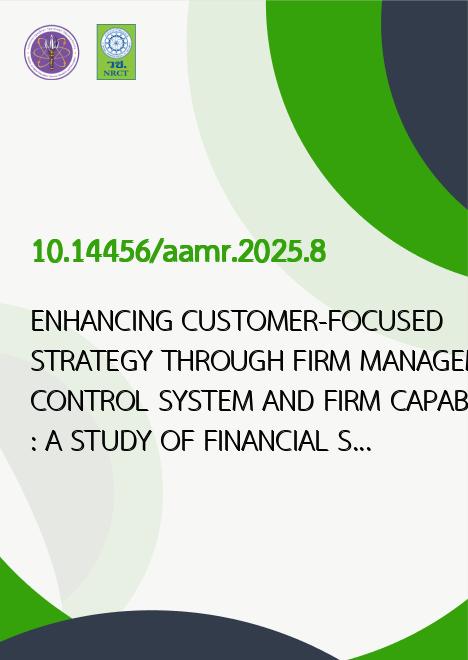
|
ENHANCING CUSTOMER-FOCUSED STRATEGY THROUGH FIRM MANAGEMENT CONTROL SYSTEM AND FIRM CAPABILITIES: A STUDY OF FINANCIAL SERVICES SECTOR |
|---|---|
| รหัสดีโอไอ | |
| Creator | Kittisak WONGMAHESAK |
| Title | ENHANCING CUSTOMER-FOCUSED STRATEGY THROUGH FIRM MANAGEMENT CONTROL SYSTEM AND FIRM CAPABILITIES: A STUDY OF FINANCIAL SERVICES SECTOR |
| Contributor | Fazida KARIM, Nititorn WONGCHESTHA |
| Publisher | Asian Administration and Management Review |
| Publication Year | 2568 |
| Journal Title | Asian Administration and Management Review |
| Journal Vol. | 8 |
| Journal No. | 1 |
| Page no. | Article 8 |
| Keyword | Strategic Performance Measurement System, Firm Capabilities, Organisational Learning, Financial Services Sector, Customer Forced Strategy |
| URL Website | https://so01.tci-thaijo.org/index.php/AAMR |
| Website title | https://so01.tci-thaijo.org/index.php/AAMR/article/view/277381 |
| ISSN | 2730-3683 |
| Abstract | Existing literature often examines the impact of an organization's strategic performance measurement system (SPMS) on its customer-focused strategy (CFS) in various situations. Nevertheless, in the unusual setting of the financial services sector (FSS) in underdeveloped countries, the ability of the system to have a positive effect on the firm’s strategy by affecting the uncommon internal and external capabilities (IEC) of the organization has indeed failed to carry out a comprehensive academic investigation. The aim of the current study is to fill this gap by using FSS within the context of Thailand. Findings show that SPMS helps improve the organization's robustness and market orientation by playing a positive role in their CFS from three different aspects - organizational learning (OL), customers, and competitors. Researchers suggest that effective CFS would be achieved by focusing the SPMS of the organization to have a positive impact on OL, which ultimately results in a high level of competitiveness for the company in the market. In the specific context of the FSS of an underdeveloped country, the unexplored relationship among the strategic performance measurement system, the CFS, and the firm’s IEC not only fills the research gap but will also stimulate new academic discussion. This research would contribute to advancing management accounting methods in developing countries' service institutions. |
